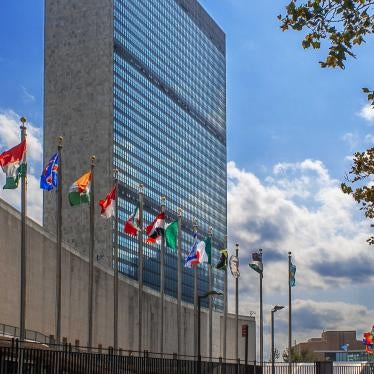Thank you, Madam Chair.
I am delivering this statement on behalf of Human Rights Watch and the Electronic Frontier Foundation. Firstly, we would like to extend our sincere gratitude for your tireless efforts on this text.
In our view, Rev. 3 remains fundamentally flawed, with its broad scope and insufficient human rights safeguards. We are deeply concerned that the current draft would expand government surveillance and facilitate cross border human rights abuses.
The scope of this draft text significantly exceeds the intended mandate of this committee.
The current title equates cybercrime with any crime involving information and communications technologies (ICTs), which governments may use to justify passing domestic laws that use expansive definitions of cybercrime. Likewise, the proposed protocol to address additional crimes signals a clear intent to further expand the treaty’s reach.
We recommend limiting Article 3 to specific criminal investigations and prosecutions of offenses established in accordance with Articles 7-17. If investigative and cooperation powers extend beyond Articles 7-17, Articles 23 and 35 should be limited to specific cases where there is reasonable suspicion to believe that a serious crime has been committed and that the offense is legitimately criminalized under international human rights law.
We support OHCHR’s proposed amendments to the definition of “serious crimes” in Article 2(h) to limit the potential inclusion of conduct that is protected under international human rights law.
On human rights safeguards, Article 6(2) is a welcome improvement in the text, and deleting it would be a clear signal that states intend to use this treaty to suppress human rights.
Article 24 should be amended to ensure it incorporates international human rights principles, particularly legality and necessity, and it should apply to the entire treaty, not just Chapter IV.
Article 35 urgently requires a dual criminality requirement, an explicit human rights safeguards provision, and a prohibition on mutual legal assistance in cases where there are credible reasons to believe that the request is politically motivated or arbitrary.
The convention’s approach to child sexual abuse materials risks violating children’s rights. Article 14(4) would criminalize consensual conduct between similarly aged children contrary to guidance by the UN Committee on the Rights of the Child. Article 14(2) risks criminalizing material with evidentiary, scientific, or artistic value, and puts at risk the work of human rights organizations to investigate children’s rights abuses.
We understand the desire among many states to reach consensus on the text, however we remind delegates that there is no legal requirement to adopt a treaty. Rather, all states have binding international human rights obligations. Upholding those commitments in this process is crucial for maintaining the integrity of international law and we urge delegates not to compromise and adopt a deeply problematic flawed treaty.
Thank you, Madam Chair.








